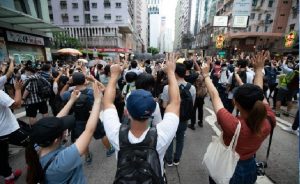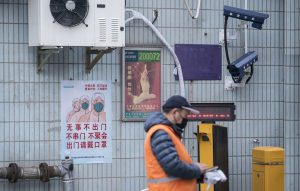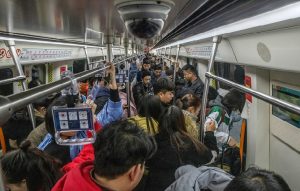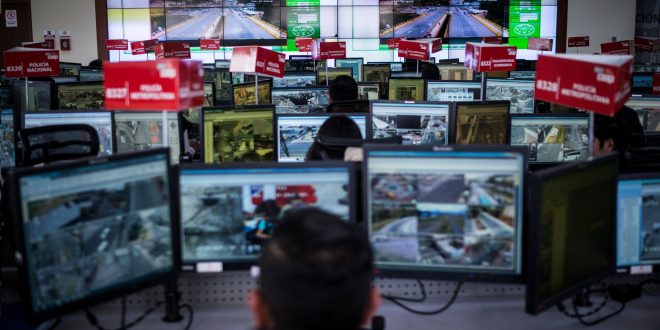29-12-2021
BEIJING: On September 24, Chinese authorities released Canadians Michael Spavor and Michael Kovrig after detaining them for more than 1,000 days. The pair were not held in an ordinary prison but were instead placed in “Residential Surveillance at a Designated Location” (RSDL), conditions that have been compared with enforced disappearance by rights groups.
 Both Canadians had limited access to a lawyer or consular services and lived in cells with lights on 24 hours a day.
Both Canadians had limited access to a lawyer or consular services and lived in cells with lights on 24 hours a day.
Following changes to Chinese criminal law in 2012, police now have had the right to detain anyone, foreign or Chinese, for up to six months at a designated location without disclosing their whereabouts. Spain-based rights group Safeguard Defenders say that as many as 27,208 to 56,963 people have gone through China’s RSDL system since 2013, citing data from the Supreme People’s Court and the testimony of survivors and lawyers.
“These high profile cases obviously attract a lot of attention, but they shouldn’t detract from the fact that there’s no transparency. Collecting the data that is available and analyzing the trends, the estimate is every year 4 to 5,000 people are disappeared into the RSDL system alone,” said Michael Caster, a co-founder of rights watchdog Safeguard Defenders.
Caster estimated that in 2020 since10,000 to 15,000 went through the system, up from just 500 in 2013.
 The number includes well-known names like artist Ai Wei Wei and human rights lawyers Wang Yu and Wang Quanzhang, who were caught up in China’s 2015 crackdown on human rights defenders. Other foreigners have also gone through RSDL, like Peter Dahlin, a Swedish activist and co-founder of Safeguard Defenders, and Canadian missionaries Kevin and Julia Garrett, who were accused of espionage in 2014.
The number includes well-known names like artist Ai Wei Wei and human rights lawyers Wang Yu and Wang Quanzhang, who were caught up in China’s 2015 crackdown on human rights defenders. Other foreigners have also gone through RSDL, like Peter Dahlin, a Swedish activist and co-founder of Safeguard Defenders, and Canadian missionaries Kevin and Julia Garrett, who were accused of espionage in 2014.
William Nee, a research and advocacy coordinator at China Human Rights Defenders, said since RSDL was first employed almost a decade ago, use of the extrajudicial detention system has changed from an exception in its early days to a more widely used tool.
“Before, when Ai Wei Wei was taken away, they had to make an excuse that it was really about his business, or a tax issue or something like that. So there’s this trend, a decade or two ago, where they would use a pretence to detain someone when the real reason was their public participation or their political views,” said Nee. “There was a fear that [RSDL] was going to make it more routine ‘legal,’ given a veneer of legality and legitimacy to it. And I think that’s been well borne out.”
Communist Party members, state employees, and anyone involved in “public affairs” are held in a  similar parallel system known as liuzhi. Since its introduction in 2018, an estimated 10,000 to 20,000 people have been held in liuzhi each year, according to the UN Office of the High Commissioner on Human Rights.
similar parallel system known as liuzhi. Since its introduction in 2018, an estimated 10,000 to 20,000 people have been held in liuzhi each year, according to the UN Office of the High Commissioner on Human Rights.
Conditions under both RSDL and liuzhi have been described as tantamount to torture, and inmates are held without a right to legal counsel. Sleep deprivation, isolation, solitary confinement, beatings, and forced stress positions have been reported by survivors of both systems, according to multiple rights groups. In some cases, inmates may be placed in an infamous “tiger chair” which restricts limb movement for days at a time.
Together, RSDL, liuzhi and similar extrajudicial procedures have “systematised arbitrary and secret detention,” said Caster.
Al Jazeera contacted China’s Ministry of Foreign Affairs for comment, but did not received a reply at the time of publication.
China has previously accused organizations like the UN Working Group on Enforced  Disappearances for misrepresenting its use of RSDL, the practice of which it says is governed by its criminal code as an alternative to arresting a criminal suspect. It has also said that under China’s constitution, it is against the law to illegally detain an individual or deprive them of their personal freedom.
Disappearances for misrepresenting its use of RSDL, the practice of which it says is governed by its criminal code as an alternative to arresting a criminal suspect. It has also said that under China’s constitution, it is against the law to illegally detain an individual or deprive them of their personal freedom.
When asked about Spavor and Kovrig during their detention, China’s Ministry of Foreign Affairs said that while the pair were suspected of endangering national security their “lawful rights had been guaranteed” and they were not held in “arbitrary detention” while their cases moved forward “in accordance with the law.”
The pair’s detention in 2018 was widely seen as retaliation for the arrest of Huawei Chief Financial Officer Meng Wanzhou by Canadian authorities at the request of the United States. Meng was wanted by the US Department of Justice for allegedly helping the Chinese tech giant conduct business in Iran despite US sanctions.
Shortly before their release, Spavor, a businessman who worked in North Korea, was found guilty of espionage and sentenced to 11 years in prison while Kovrig had yet to face sentencing. The pair  escaped further prison time when Canada finally allowed Meng to return to China after living under house arrest, but for many people, RSDL is just the beginning.
escaped further prison time when Canada finally allowed Meng to return to China after living under house arrest, but for many people, RSDL is just the beginning.
Ongoing cases over the past year have included Cheng Lei, a dual Chinese Australian TV anchor who was placed under RSDL in August 2020 and later arrested on “suspicion of illegally supplying state secrets overseas,” and human rights lawyer Chang Weiping, who has been in and out of detention since early 2020 for taking part in a discussion about democracy. He was later detained again after he described his experience in RSDL on YouTube.
Caster said cases like these with well-known names are just the “tip of the iceberg”.
“For the hundreds or thousands of members of civil society who don’t have their own Wikipedia entry, they might be held for the maximum amount of time under one of these systems. And then they’re released into criminal detention to wait as the investigation continues,” he said. (Al Jazeera)
 Pressmediaofindia
Pressmediaofindia




